|
|
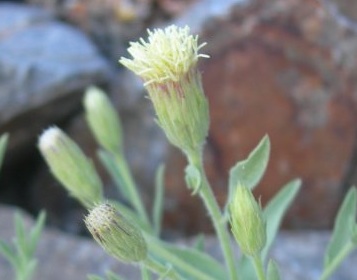
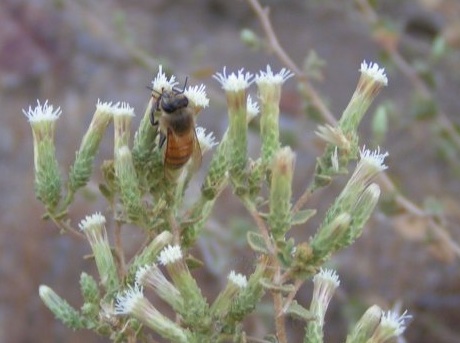
|
Brickellia
January/February
Mary DeDecker in her book about the Flora of the Northern Mojave Desert
lists ten species of Brickellia that are native to the Death Valley area.
Also, there are thirteen species of Brickellia listed in The Jepson Desert
Manual. So, one way or the other, there are
quite a few different species of Brickellia to be found in the Death Valley
area. A problem with this genus is that some of the species contained in it
are difficult to differentiate. Also many would regard the flowers produced
by these plants as less than spectacular. Just the same this is an
interesting genus and at this time there are six species of Brickellia
included in the plant collection at the Death Valley Plants website:
|
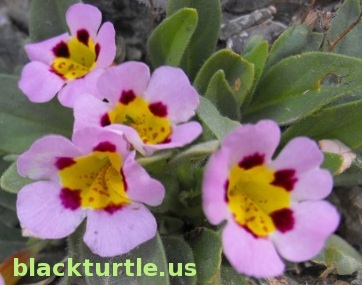
|
Rock Midget
March/April
Also known as Death Valley Monkeyflower, Rock Midget is found only in the
Death Valley area. In fact, the California Native Plant Society lists it as
a rare and endangered species. Although the plants grow to a height of less than six
inches, they produce some pretty spectacular flowers. So, observing this plant in its native habitat
is quite a treat. Although in the past
this plant has been listed as a member of the Snapdragon Family
(Scrophulariaceae), it has
recently been reclassified as a member of the Lopseed Family (Phrymaceae).
(Click here for more info!)
|

|
Button Brittlebush
May/June
There are many plants which occasionally produce flowers during the autumn
and Button Brittlebush is in that group. Whether or not flowers are
produced depends on rainfall, as you might expect. This year there were a
couple heavy storms during the summer and so there were quite a few plants
producing flowers this fall. In fact, it is not an exaggeration to assert
that the fall bloom was more spectacular than the spring bloom this year!
Although a single flower produced by Button Brittlebush is not all that
attractive, a bush with a bunch of blooms looks kind of neat as can be seen by
clicking on the following link:
(Click here for more info!)
|

|
Devil's Claw
July/August
Although Devil's Claw is listed as a plant that can be found at a few
locations in and around Death Valley, I have never been able to locate a
specimen. Specifically, this plant is supposed to be present in Johnson
Canyon on the Death Valley side of the Panamint Range and Hunter Canyon in
Saline Valley. It's also reported to have been observed somewhere in
Panamint Valley, but I'm not sure exactly where. In any case, I grew a plant
in my backyard since I couldn't find any in the wild!
(Watch the video!)
(Click here for more info!)
|
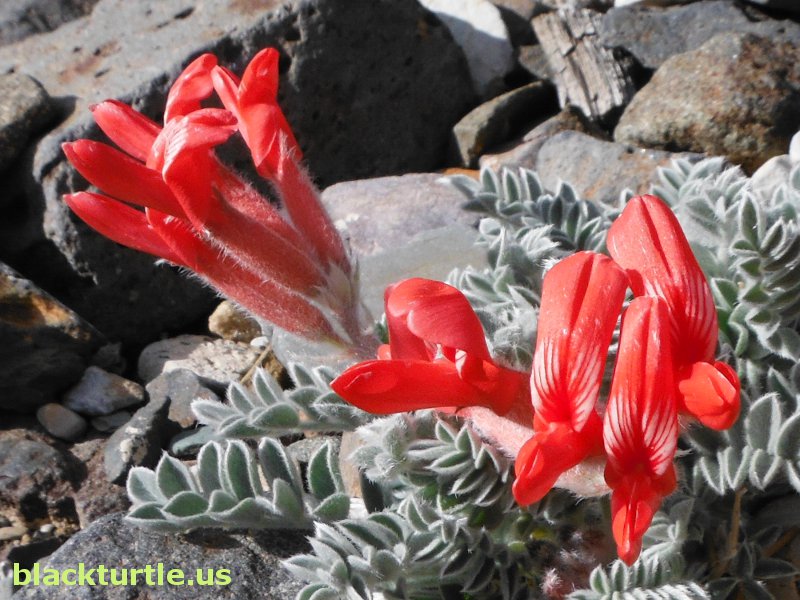
|
Scarlet Milkvetch
September/October
Fall wildflowers are always a treat, but an encounter with scarlet milkvetch
is pure delight! Normally this plant blooms during the spring, but some
years, following sufficient summer rainfall, it may produce flowers during the
autumn months. Scarlet milkvetch grows at elevations between 2100 and 8000 feet and
is most commonly found growing in a Pinyon-Juniper Woodland plant community.
Sightings have been reported in several mountain ranges in the Death Valley
area, including the Panamint, Argus, Inyo, and White ranges.
(Click here for more info!)
|

|
Cryptantha
November/December
Certain species of Cryptantha (commonly referred to as Forget-Me-Nots) are
among the first flowers to bloom each year. Some begin blooming in February.
The Jepson Desert Manual lists thirty-six species of Cryptantha which are
found in the Desert Southwest. Likewise, Mary DeDecker lists thirty-one
species of Cryptantha which grow in the Northern Mojave Desert. Many members
of the genus Cryptantha are what are often called "belly flowers" due to
their small size. Incidentally, certain species of Cryptantha produce
flowers only one-sixteenth of an inch wide.
(Click here for more info!)
|
|
| |
|

blackturtle.us
PLANT
BLOG
BLOG INDEX
ASSOCIATED SITES:
Trona News
Rusky Ed
Any Place Education
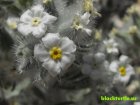



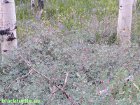

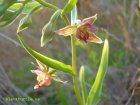

|

















